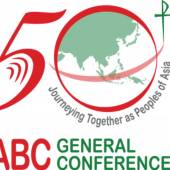FABC: Opportunities for new forms of leadership and governance for the Church in Asia

The topics of the fifth day of ‘Emerging Realities in Asia”, FABC Bishops discussed Synodality, leadership, and governance, in the light of Praedicate evangelium (Preach the gospel), apostolic constitution on the Roman Curia reforms promulgated on 19 March 2022.
Jean-Claude Cardinal Hollerich SJ, Relator General of the XVI Ordinary General Assembly of the Synod of Bishops, speaking on the Synod on synodality, explained the process of how the document was developed, and related his experience working on it.
Stressing the Holy Father’s emphasis on everyone walking together with no exclusions, Cardinal Hollerich described the Synod as a Synod of the Church, where the consultation of peoples became the heart of the Synod, and where Christ and His mission remains at the centre of the Church.
Professor Josef Sayer, Director of Misereor from 1997 to 2012 and member of the FABC 50 Organizing Committee, provided a comprehensive explanation of the Prædicate Evangelium, using four central points: the preamble, principles, general norms and dicasteries. With emphasis on the Holy Father’s reforms, the paradigm shifts, the importance of participation of all, and the application of the dicasteries, Sayer outlined opportunities for new forms of leadership and governance for the Church in Asia.
Christina Kheng, professor of pastoral leadership and management at the East Asia Pastoral Institute (Philippines), and member of the Commission on Methodology of the General Secretariat for the XVI Ordinary General Assembly of the Synod of Bishops, spoke on the topic ‘new forms of leadership and governance in the Church in a synodal way.’
Going back to the roots of synodality, Professor Kheng asked her listeners, ‘what current forms of leadership in your Diocese promote synodality and what forms are contrary to it?’. Along with key principles of synodal leadership and governance, she also provided concrete suggestions to put the principles into practice.
Bishop Pablo Virgilio David, President of the Catholic Bishops’ Conference of the Philippines, reflecting on how new forms of leadership could be promoted, added context through the history behind the first council of Jerusalem, and Peter’s role in it. Underlining the Church as one rooted in scripture and responds to the signs of the times, Bishop David provided insights on the Holy Father’s reformations, and highlighted
Jonathan Tan, professor of Catholic Studies at Case Western Reserve University in Ohio, spoke on the topic, “FABC 50 Years On: Negotiating Challenges and Seizing Opportunities”. Introducing his background of work and analysing the demographics of migration and the changing population, and the rich documentation of the FABC, Prof Tan described how Christianity has moved on from grounded geography to virtual and online communities of faith, and trends that would arise in the next fifty years.
Clarence Devadass, providing a summary of the small group discussions, recapped the theme of the week using the framework of consultation, conversation, conversion and communion. Father Devadass summarised the discussions with three key points: celebrating successes, recognising the gaps, and identifying the opportunities ahead by looking for new pathways.
- With inputs from the Press release of the FABC Media Office
Radio Veritas Asia (RVA), a media platform of the Catholic Church, aims to share Christ. RVA started in 1969 as a continental Catholic radio station to serve Asian countries in their respective local language, thus earning the tag “the Voice of Asian Christianity.” Responding to the emerging context, RVA embraced media platforms to connect with the global Asian audience via its 21 language websites and various social media platforms.














